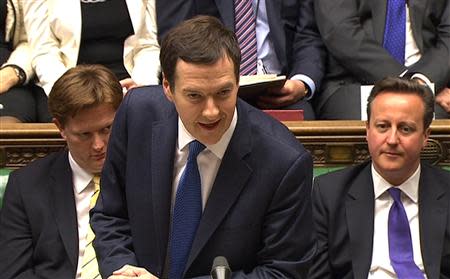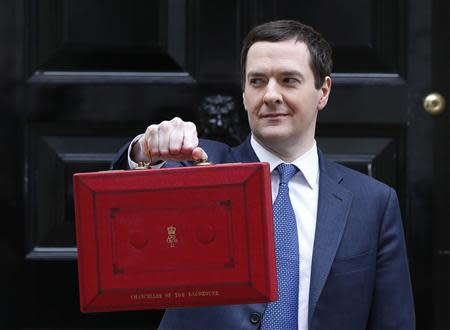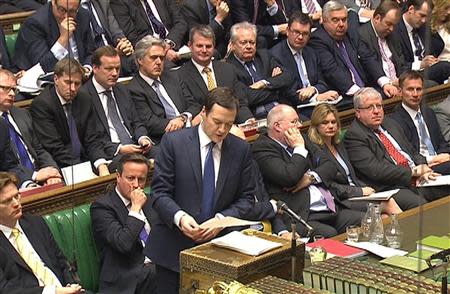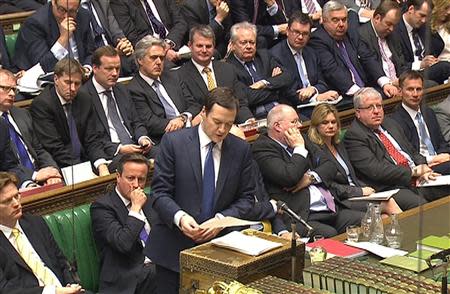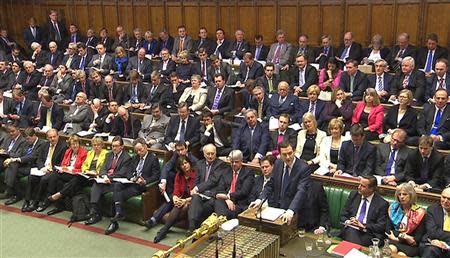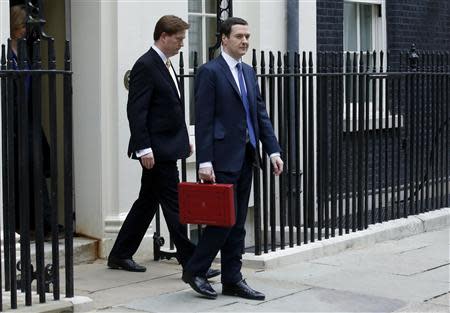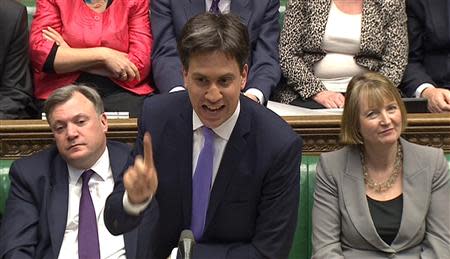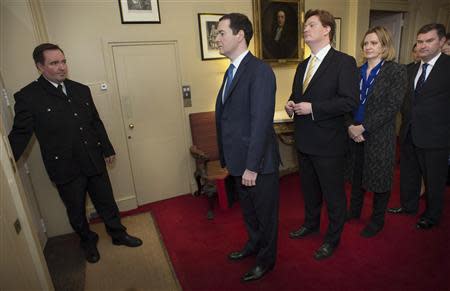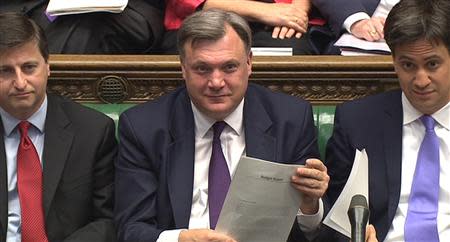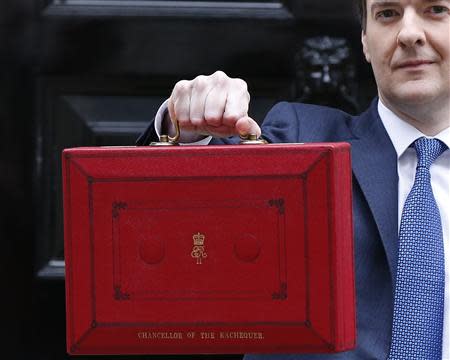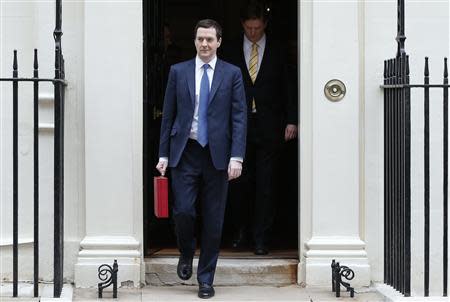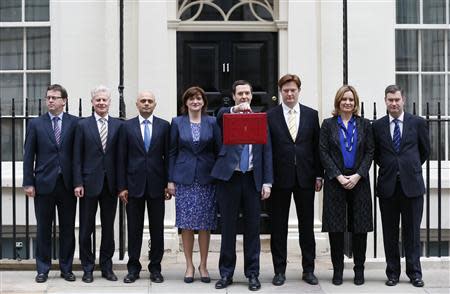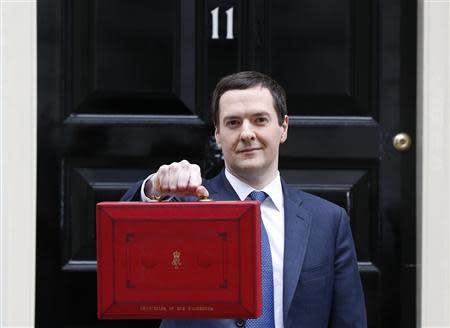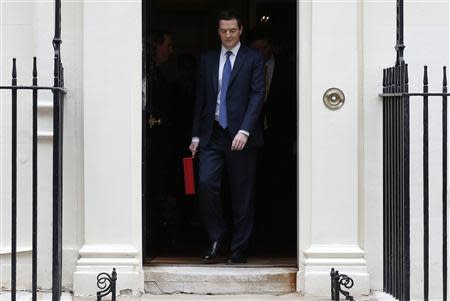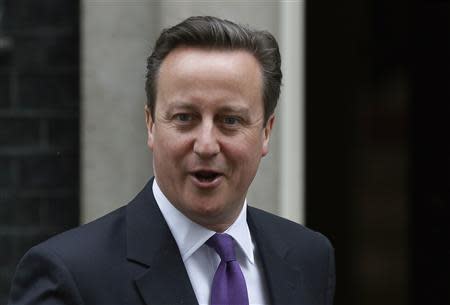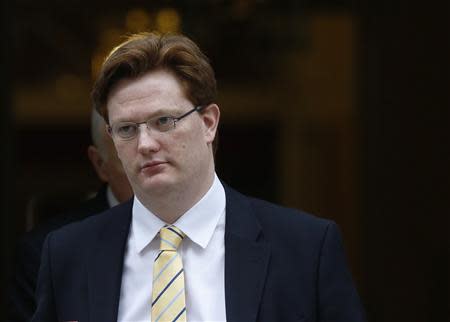UK government offers help to savers, factories, brewers
By William Schomberg and David Milliken LONDON (Reuters) - Chancellor George Osborne courted voters ahead of an election in 2015 with promises of help for savers, tax breaks for manufacturers and lower levies on beer and bingo. In an upbeat annual budget statement on Wednesday, Osborne announced upgrades to official forecasts for economic growth, although he stressed he would stick to his belt-tightening plans which include a cap on welfare spending. His help to savers - who have been hurt by near-zero interest rates - included an easing of requirements on pensioners to buy annuities. The government will also create savings accounts which will pay above-market interest rates to people aged over 65. Shares in insurance firms fell on what Osborne called the "most far-reaching reform" to pensions in nearly 100 years. Legal & General stock closed more than 8 percent lower. The price of 30-year British government bonds suffered their biggest one-day drop in a month, as insurers who sell annuities are a major source of demand. Shares in gambling firms also weakened on news of a new tax for the industry, even as Osborne cut a levy on bingo. Britain goes to the polls in May 2015 and the annual budget plan is one of the government's last opportunities to make a difference to how people feel about their finances before then. The opposition Labour party said the budget failed to help ordinary people. Osborne hopes the improving economy and his focus on fixing Britain's public finances will be trump cards in the fight against Labour, which remains a few percentage points ahead of the Conservatives in opinion polls. "I have never shied away from telling the British people about the difficult decisions we face. And just because things are getting better, I don't intend to do so today," he said, adding more spending cuts would be needed after the election. Osborne announced the latest in a series of increases in how much people can earn before paying income tax. He also raised the threshold at which British earners pay a higher tax rate of 40 percent for the first time since the 2010 election. Treasury officials stressed the budget did not represent a relaxation of the government's fiscal drive. New forecasts by the Office for Budget Responsibility painted a picture of solid recovery with the economy now set to grow 2.7 percent this year. That was higher than a projection of 2.4 percent made as recently as December and much higher than the OBR's estimate of 1.8 percent a year ago, when Britain was still struggling to shake off the after-effects of the global financial crisis. "That's the biggest upward revision to growth between budgets for at least 30 years," Osborne said to cheers from members of his Conservative party. Growth in 2015, Osborne said, was expected to be 2.3 percent, up slightly from December's forecast of 2.2 percent. The OBR's forecasts, while higher than in December, are less optimistic than many others. The Bank of England expects growth of 3.4 percent in 2014 in Britain, faster than most other developed economies. Even so, the economy remains smaller than it did in 2008, before the financial crisis, underscoring how slow the recovery was before picking up speed in the last 12 months. In a bid to help put the recovery on a sounder footing, Osborne announced a doubling of a tax break for firms that invest and measures to help bring down electricity bills. The government has been trying to reduce the reliance of the economy on consumer spending since it took power in 2010. DEBT REDUCTION The improved outlook shaved 24 billion pounds ($40 billion)from the official forecasts for Britain's still-huge budget deficit over the next few years. It also means debt is likely to peak at slightly less than previously thought. Britain will run a budget deficit of 5.5 percent of GDP next year - half its level at the time of the May 2010 election, but still well above the level elsewhere in Europe and higher than Osborne had pledged to reduce it to when he came to power. To help keep Britain on track with its plan to get rid of the deficit by the 2018/19 fiscal year, Osborne said the government will cap the amount of money it spends each year on welfare at 119 billion pounds in the 2015/16 fiscal year. Labour leader Ed Miliband criticised Osborne's budget. "Today the chancellor (Osborne) simply reminded people of the gap between his rhetoric and the reality of peoples' lives - living standards falling for 44 out of 45 months under this prime minister, unmatched since records began," he said. "No amount of smoke and mirrors can hide it." With an eye on Scotland's independence referendum, Osborne announced new tax breaks for investment in North Sea oil and gas production. He also took a swipe at Scottish nationalists, noting that the OBR had revised down its estimate of how much tax revenue could be raised from Scotland's oil and gas reserves by a further 3 billion pounds. Osborne also froze duties on whisky and other spirits, a move which is likely to be welcomed by Scottish distilleries. (Additional reporting by Andy Bruce, Ana Nicolaci da Costa, Jemima Kelly and the UK bureau; Editing by Jeremy Gaunt and Catherine Evans)
